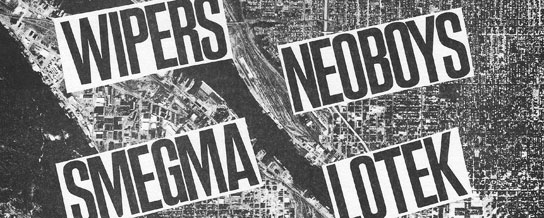Portland Punk: A Brief History
Portland is now gaining a worldwide rep as a hub of forward-thinking indie music and […]

Portland Punk: A Brief History
Portland is now gaining a worldwide rep as a hub of forward-thinking indie music and […]

Portland is now gaining a worldwide rep as a hub of forward-thinking indie music and culture, but all these art-rock wunderkind can trace their DIY lineage back to the city’s punk scene of the late ’70s and early ’80s.
Already 29 when the punk scene started to boom in the late ’70s, Mark Sten was front and center as a promoter, soundman, and member of numerous groups, including the pub-rock band King Bee (with Dead Moon’s Fred Cole). “I got the bright idea in early ’77 that we should just go ahead and call ourselves a punk band because I was really liking the stuff I was beginning to hear,” says Sten, explaining that the early punk scene was more about swagger than a particular sound. “That was much more of a publicity move than it was a legitimate characteristic of what we were playing.”
The early Portland punk scene was less about strict genre confines and more about creating reactionary sounds. As such, it attracted everyone from noise dabblers Smegma (who Sten calls “reeking hippies involved with tape loops”) to Sado-Nation and their sloppy energy, from the early hardcore of Ice 9 to the all-girl attack rock of the Neo-Boys.
At the top of the heap were The Wipers, who made the other bands seem “amateurish,” Sten says. Combining the raw power of garage rock with punk aggression and psychedelic innovation, the band influenced everyone from Nirvana to No Age. “The Wipers were a really powerful, efficient, technically capable band,” recalls Sten. “I haven’t heard their particular blend of a Ramones-type rhythm and psychedelia anywhere else. The marriage of Johnny Ramone and Jimi Hendrix worked out really well in [guitarist Greg Sage’s] hands. You can hear [his] chords and go, ‘That’s a Wipers chord.’”
While punks in other cities were primping their mohawks and blowing cash on bondage gear, the eternally low-income Portland had more of a gutter, anything-goes feel. “David Carboy from Sado-Nation looked across the street at a group of punks with new leather jackets and torn jeans and tennis shoes, and looked at the other side of the street at two girls wearing pajamas,” Sten remembers. “He pointed across the street and said, ‘Seattle punks,’ and pointed at the girls in pajamas and said, ‘Portland punks.’”
The city has had as much, if not more, influence on the music than the records made there. “There used to be something in the water in Portland that kept people a little bit more eccentric than they are in places like Seattle or Bakersfield,” Sten says. “There was a sense of having been freed up that was not followed immediately by being closed in by a new set of rules. Punk, for a few years, remained a liberating factor without establishing its own conventions quick enough to replace what had just been discarded.
“Since the ’60s, Portland has been a very progressive and conventionally liberal town,” he continues. “It’s a mecca for lesbians and homosexuals. It’s desperate to embrace racial diversity even though there aren’t that many blacks in town.” The result, Sten says, is a sort of meta-rebellion that isn’t found in other cities. “People in Portland aren’t rebelling against some sort of normal political establishment or city bourgeoisie. They’re rebelling against people who would be considered rebels elsewhere. It yields people who are not really amoral, but are definitely carving out their own niche. I would cite [filmmaker] Gus Van Sant and [writer] Adam Parfrey [as prime examples].”
Today, Northwest punk is still going strong, with plenty of its own newsgroups and zines, fantastic local acts like Defect Defect, Red Dons, or The Clorox Girls playing house shows throughout the city, and a bevy of local record stores (Discourage, Green Noise, Brickwall) keeping the sound alive. And unlike other cities, Portland’s punk progenitors continue to be in the mix, with Smegma’s Mike Lastra running a recording studio and Dead Moon’s Fred and Toody Cole still raging strong.

